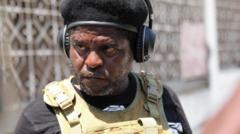This decision comes amid ongoing tensions regarding deportation laws and human rights issues related to El Salvador's prison conditions.
El Salvador's President Refuses to Repatriate Man Wrongly Deported by US

El Salvador's President Refuses to Repatriate Man Wrongly Deported by US
El Salvador will not take back Kilmar Ábrego García, a man mistakenly deported from the US, as President Nayib Bukele discusses immigration policies with Donald Trump.
El Salvador's President Nayib Bukele has made it clear that he will not facilitate the return of Kilmar Ábrego García, who was mistakenly deported to El Salvador from the United States. Highlighting his strong relationship with former President Donald Trump, Bukele announced this decision during a meeting at the White House. This comes after the US Supreme Court ruled last week that the Trump administration was required to "facilitate" Mr. Ábrego García's return due to an administrative error in processing his deportation.
The case surrounding Ábrego García has attracted attention as he was living in Maryland with his family, where he was granted legal protections against deportation in 2019. While the Trump administration, particularly Attorney General Pam Bondi, has claimed that the decision whether to return Ábrego García lies with El Salvador, the issue continues to spark debate about immigration policy and the treatment of deportees in the Central American nation.
In the larger context of US-El Salvador relations, Trump has praised Bukele for his partnership in accepting US deportees, particularly those accused of being gang members. Ábrego García's attorney has vehemently denied allegations that he is affiliated with gangs, despite the US government's claims linking him to MS-13. Bukele's administration now holds Ábrego García in a heavily criticized mega-prison designed for high-risk inmates, known as the Center for the Confinement of Terrorism (Cecot).
During the meeting in Washington, Trump reiterated his intent to deport American citizens convicted of violent crimes to Salvadoran prisons, alongside many others the administration is sending. Recent reports indicate that Bukele’s tough-on-crime stance has gained favor with Washington, providing financial incentives for accepting deportees while simultaneously receiving heavy domestic scrutiny regarding human rights violations.
As this story unfolds, the conditions within Cecot, noted for lacking basic legal protections and overcrowding, have raised alarms among human rights advocates. Reports indicate that the prison is often filled beyond capacity, offering minimal daily access to exercise and sleep accommodations. Family members of deportees have spoken out, asserting that many innocent people with no gang affiliations end up being targeted, creating a humanitarian crisis in El Salvador.
As El Salvador maintains its refusal to return Kilmar Ábrego García, both leaders continue to navigate the complex political landscape surrounding immigration, legal obligations, and human rights, with significant implications for future relations between the countries.


















